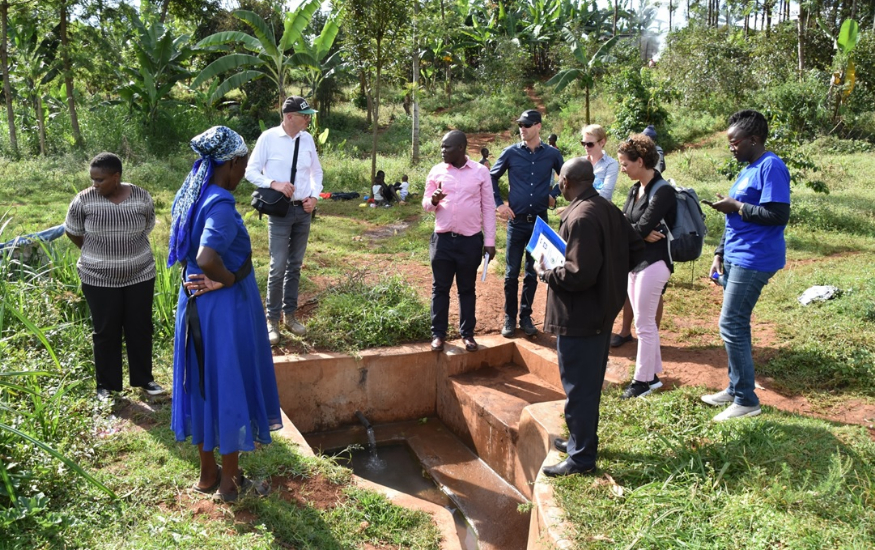On April 15, Esther Janssen conducted the training Working with Other Cultures, as part of the Blue Deal learning programme. 11 participants from various Dutch water authorities took part in the training. Janssen remarked: "Culture is a critical success factor for collaboration."

Janssen, owner of Culture-Inc., shares her experience from a work trip to Ethiopia last year. At the beginning of the trip, Ethiopian and Dutch colleagues made agreements regarding their collaboration. “Openness in communication is key,” they concluded. “But what does that mean exactly?” Janssen asked. “Does it mean I can say whatever I want?” The Ethiopians looked surprised, replying: “No, of course not!” This is just one example of how communication styles or meanings can differ among people.
Understanding cultural differences
This is why it’s crucial for colleagues in the Blue Deal partnerships to have insight into cultural differences for effective collaboration. Hence, it’s mandatory for all Dutch experts traveling abroad for work to undergo the Working with Other Cultures training. Many partnerships also organise similar activities with their entire team in the country where they operate.
Impact of one’s behaviour on others
What do the experts themselves want to learn during this training? One participant asks: “What should I absolutely avoid doing? Where do I cross the line? And why do I sometimes get no response at all when I ask a question during a presentation?” She recounts a workshop she conducted in Ethiopia where she received no response to questions posed to the group as a whole, whereas in the Netherlands she would have. “It’s like there’s an invisible barrier that I don’t see, but they do.” Other participants in the group also want to be more aware of the impact of their own (Dutch) behaviour.
What is culture?
Janssen first explains what culture actually entails. “Think of it as a computer’s default settings. It’s the habits, manners, and norms instilled since childhood. Within that group, everyone understands what you mean.” She continues: “Culture is essentially solidified history. To understand a group’s culture, you have to look at everything that came before it: the history, geography, defining moments.”
Different types of cultures
She also explains the different types of cultures into which countries can be categorised. For instance, the Netherlands belongs to the group of linear-active cultures. These cultures are characterised by direct communication style, trust in institutions, and little importance placed on hierarchy. In multi-active cultures, people often have a very active and emotional communication style, and status is based on charisma and connections. In reactive cultures, people often express themselves less, avoiding loss of face is crucial, and connections are incredibly important. Most Blue Deal countries fall under multi-active or reactive cultures.
Avoiding offenses
And this, in turn, affects how you communicate, collaborate, what’s respectful, or what isn’t. While a Dutch person might feel offended if the other party doesn’t make eye contact during a conversation, in another culture, it might be considered respectful. And who do you greet first? In many countries, it might be considered respectful to greet the eldest or the leader first. How do you greet that person anyway? And what questions do you ask or avoid? Numerous examples of (minor) cultural differences that are still significant in collaboration.
Don’t be too direct
What does this mean concretely? How do you deal with this? Janssen explains how important it is to give feedback in the right way. Dutch people can often be very direct, sometimes too direct. “Always start by mentioning the positive. And frame the aspects that are not going well differently. For example, as: what points do we still want to achieve or where do we see possibilities for further improvements.” Often, it helps if the partnership involves someone who can act as an intermediary. Someone who has grown up in the local culture but is also accustomed to working with Dutch people, so that this person can prevent any miscommunication.
Cultural buttons
“How far should you go in adapting to the other culture?” one of the participants asks. Because completely pretending to be someone else is obviously not the goal. Janssen responds: “And that wouldn’t be possible anyway. You can’t suddenly become entirely Chinese as a Dutch person, nor should you. But you can see what works. Which cultural buttons can you press to collaborate as effectively as possible?”
Join a training
Are you an expert from Dutch Water Authorities and would you like to participate in this or another training from the Blue Deal learning programme? Please contact the partnership manager of your partnership or send an email to info@bluedeal.nl. These are the upcoming trainings:
- May 16: Introduction into the Blue Deal, in Amersfoort
- June 24: Working with Other Cultures, in Amersfoort
